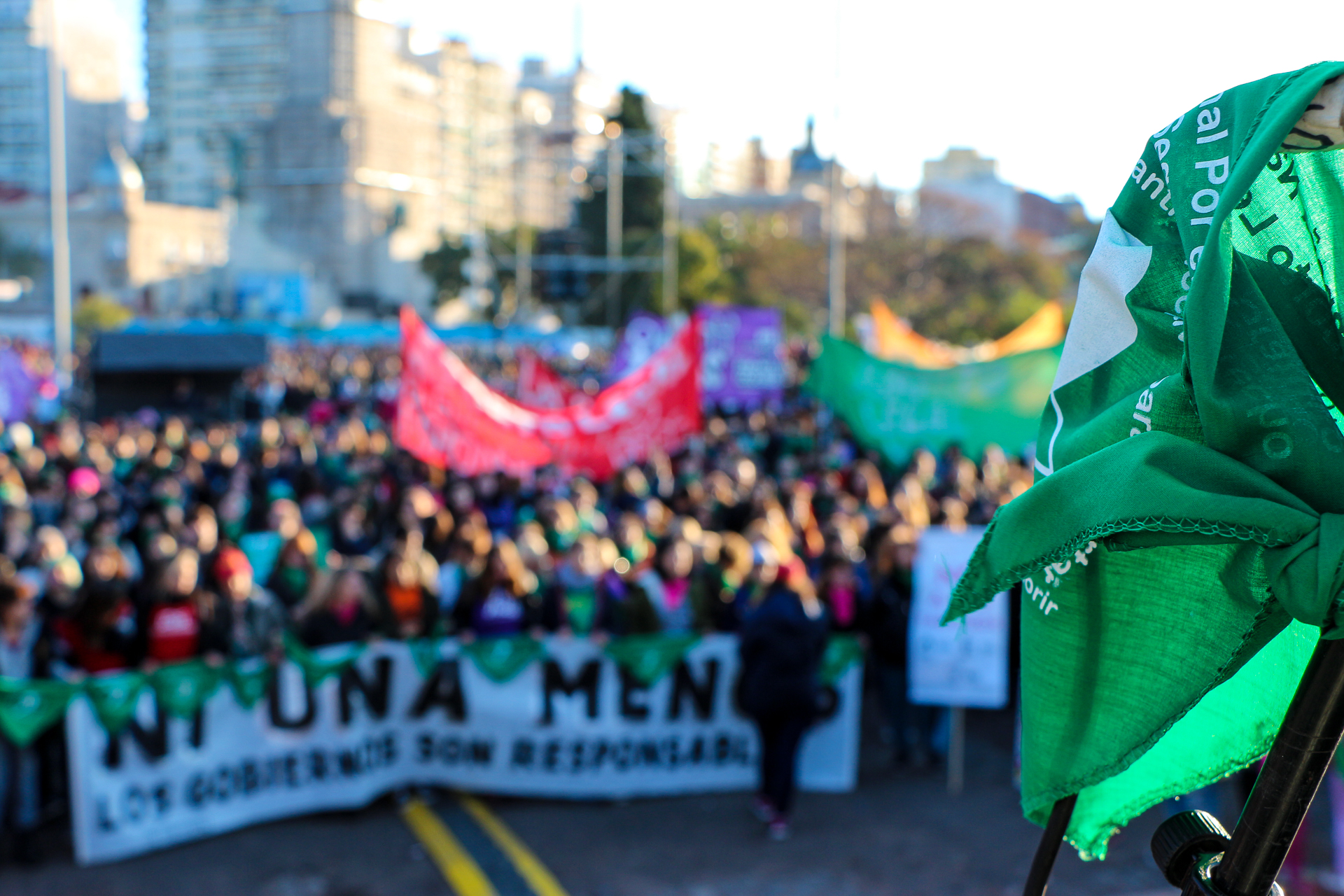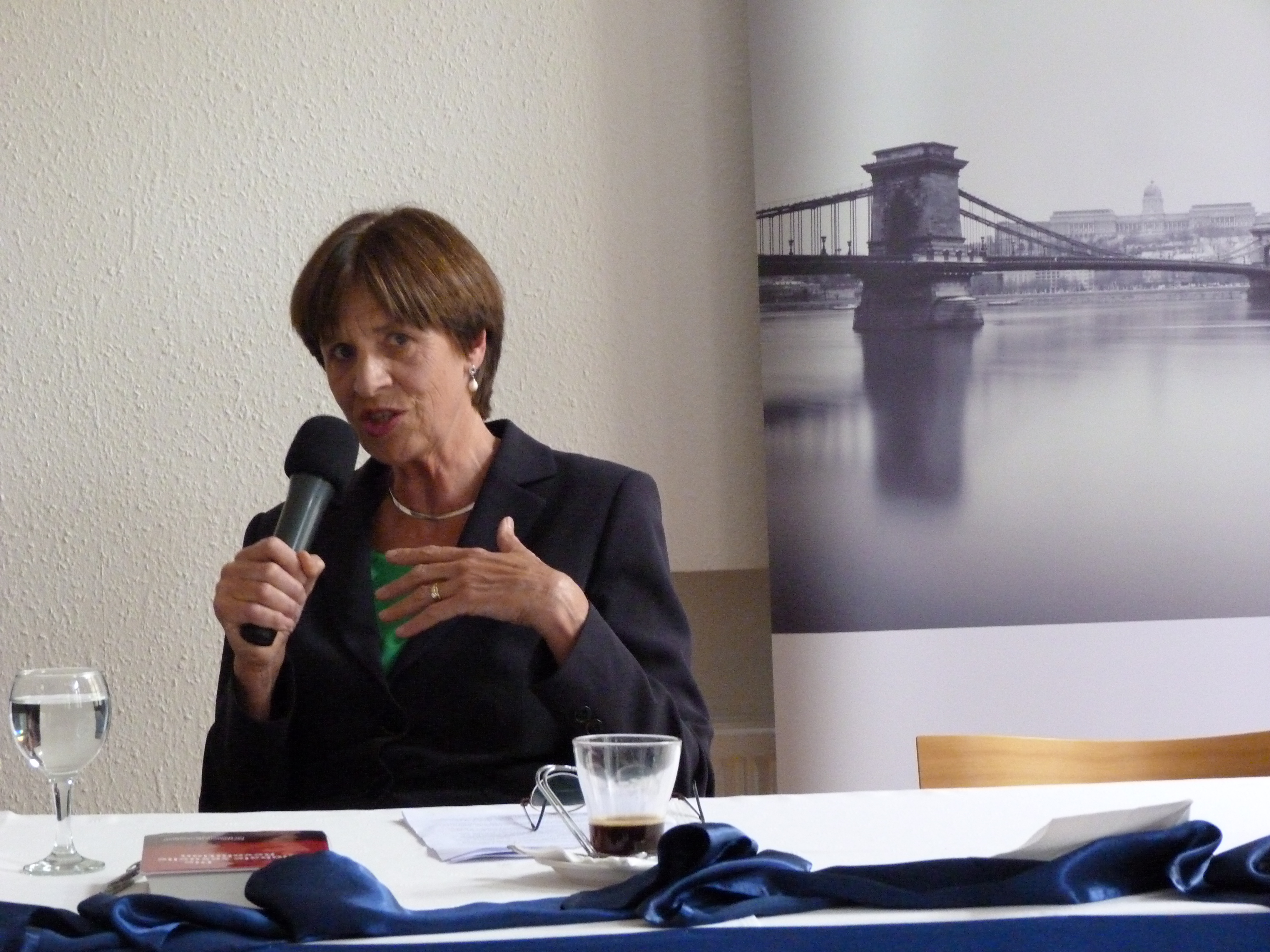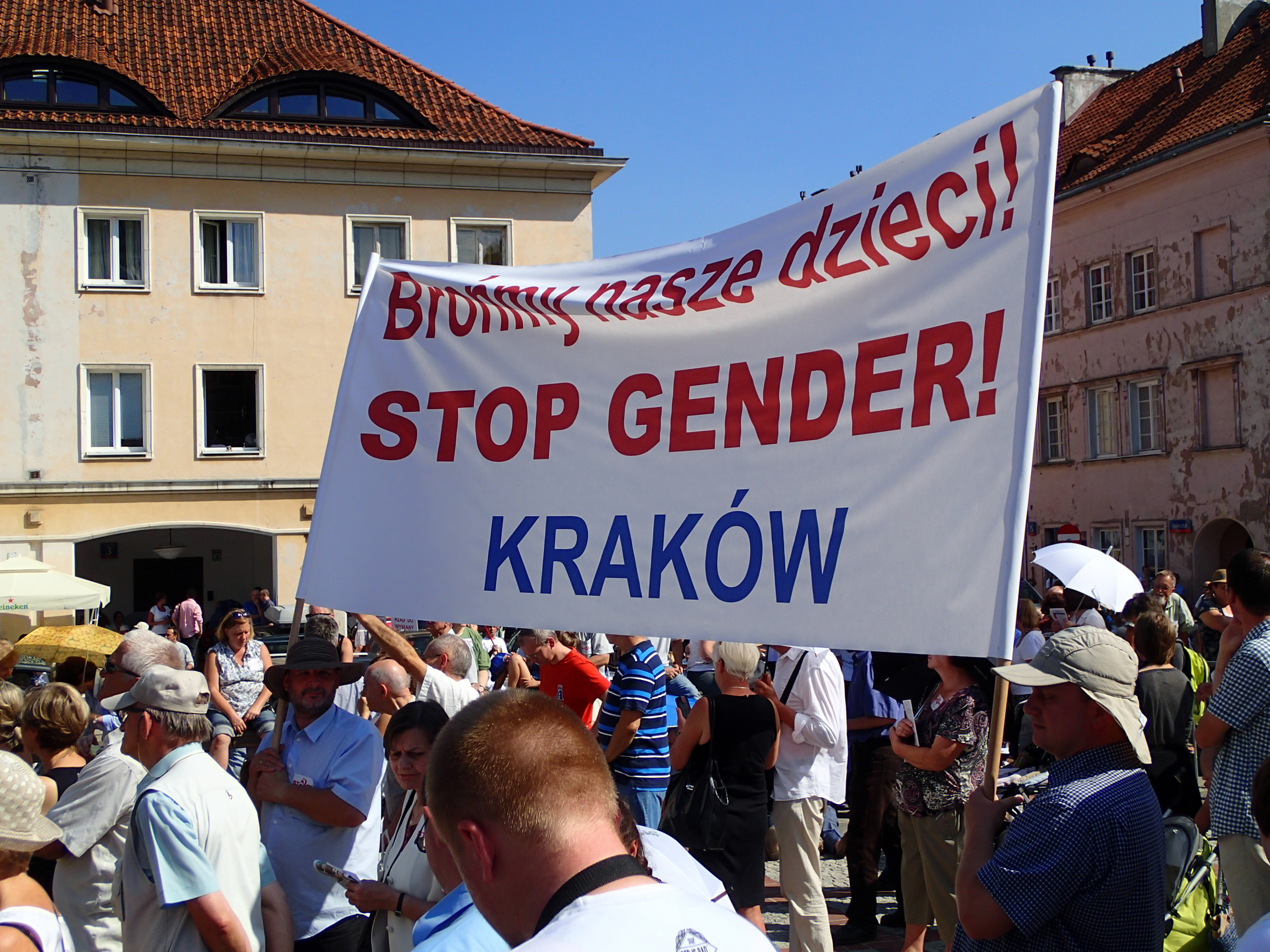In this long-read article for The New Pretender Jenny Gunnarsson Payne offers an in-depth analysis of the emergence and power of so-called “Anti-Gender” movements and campaigns both here in Europe and Globally. Situating these critics of “gender ideology” as part of a larger populist moment across Europe, and as a partial response to the crisis of neo-liberal hegemony on the continent, Gunnarsson Payne argues that the politics of sex and gender are integral to any articulation of “the people”. As such, this article seeks to ‘shed further light on the role that anti-gender politics plays in Europes populist moment’, whilst also charting points of resistance, counter-struggle and cause for optimism, not least when we look beyond western Europe.
Gender ideology as a populist challenge
There has to be an “us”, because now there is a “them”.[1]
In recent years, the idea that there is something called gender ideology has become increasingly influential in political life, on a global scale. Demonstrations are held in protest of it, authoritarian-minded leaders are mobilising it to win elections, sexual and reproductive rights are rolled back because they are seen as a result of it, and academic freedom is being impinged because some disciplines are seen as propagating it. This idea can be found in the rhetoric of a diverse range of conservative Christian groups, populist right-wing parties, authoritarian leaders, neo-Nazi groups, and anti-feminist movements, and in many countries it is swiftly making its way into mainstream politics. As a result, “gender” has come to play a central role in the construction of political frontiers in the currently polarised political situation that Chantal Mouffe (2016; 2018) has called Europe’s populist moment.
This populist moment has emerged after several decades of neoliberal hegemony that has failed to live up to its promises of prosperity and progress for all, and a post-political consensus that has collapsed the division between right and left, leading to the lack of clear political alternatives. This hegemonic dominance is now being challenged by various right-wing and left-wing anti-establishment movements who claim to speak in the name of “the people”, but that are defining “the people” in radically different ways (2018: 3-5). Whether this development will (as it already has in some countries) lead to weakened liberal-democratic institutions and more authoritarian regimes throughout Europe, or whether it will pave the way for “a reaffirmation and extension of democratic values” in the region remains to be seen. In either case, the outcome of this populist moment will be decisive for the future of European democracies (Mouffe 2018: 6-7).

But although issues of “gender” are playing a central role for drawing the frontiers between these two political alternatives – indeed, for the very construction of their respective versions of “the people” – the topic has remained under-acknowledged in theoretical and political discussions outside of feminist academic- and activist circles. Therefore, this essay seeks to shed further light on the role that anti-gender politics plays in Europe’s populist moment. How come “gender” has become the object of political polarisation now, after decades of national and transnational gender equality and anti-discrimination politics? Does it differ from previous versions of feminist backlashes and anti-feminism, and if so, how? Why has it proven to be so easily integrated into nationalist right-wing projects? And how come that it has taken such strong hold of Europe, where opposition to gender equality and sexual diversity has been widely presumed as “alien to the European experience”, or at worst as a historical or religious relic, destined to die a natural death in the wake of modernisation and progress (Kuhar & Paternotte 2017:3).
The emergence of anti-gender politics
In order to understand the success of the current anti-gender politics, we need to take into account that while it has gained momentum in broader circles in Europe only since the early to mid-2010s, its proponents have been mobilising for over two decades. Indeed, its emergence can be traced to Catholic opposition to UN-policies that were formulated in the mid-1990s, and especially so in relation to the 1994 UN Conference on Population and Development in Cairo and the UN Fourth Conference on Women in Beijing in 1995. The derogatory term “gender ideology” was formulated as part of a global Catholic strategy to counter what they saw as a risk that the UN’s increased emphasis on gender equality and sexual and reproductive rights would lead to “international recognition of abortion, attacks on traditional motherhood and a legitimation of homosexuality” (Kuhar & Paternotte 2017: 9, see also Edenborg 2017). This strategy defies what they take to be an existing “cultural and political hegemony of ‘postmodern gender’ in the context of a global battle of ideas”, one that needs to be countered by instead reinforcing “traditional family values”, complementary gender roles and the ideal of equal dignity between men and women rather than equal rights (Kuhar & Paternotte 2017: 10). From the very beginning, the word “gender” was regarded a Trojan horse, which while innocent-sounding, was seen to carry with it an agenda to eliminate all differences between women and men, dissolve all sexual norms in favour of hedonistic sexual pleasures, destroy “traditional families” (especially motherhood) and reduce the world’s population (especially in poor countries) through family planning, contraception and abortion (O’Leary 1997; 2011; 2015). Conspiratorial as it may seem, this idea has spread far beyond the Catholic circles within which it was formulated. One key to its success, I argue, is its formulation of a clear political enemy – a “them” that is associated with an oppressive regime and as a threat to the lives of common (and “normal”) people.

This construction of an enemy comes, in its most elaborated versions, with a narrative of a 200-year long Culture War that started with Marquis de Sade and has culminated today with a powerful coalition of radical feminism, (post-)Marxism, and Judith Butler’s queer theory which is imposed on common people through totalitarian measures such as gender mainstreaming, gender quotas and sexual education in schools.[2] According to this narrative, the development of “gender ideology” has over the years been propelled by powerful coalitions of interests and movements such as Malthuseanism (to reduce the world population), eugenics, communist revolutionaries out to destroy family, religion and class society, the feminist movement, the LGBTQ-movement, philosophers, psychologists and political theorists and rich and powerful Anglo-Saxon protestants in the United States who are afraid to lose power if the poor classes manage to reproduce more than them (Kuby 2015: 17). Moreover, it portrays gender ideology as resulting from all of this, and as now being implemented by supra-national bodies such as EU and the UN and backed by global capital through rich foundations such as the Ford Foundation, the Open Society Foundation (founded by business magnate Georg Soros) and the Rockefeller Foundation (Kuby 2015: 74).
From marginal opposition to united front
For anyone even vaguely familiar with nationalist xenophobic discourses, the similarities in how the people-as-underdog versus the establishment-as-enemy are articulated should be striking. What we see here is following a very similar pattern to that which has been observed by psychoanalytic theorist Renata Salecl in relation to European nationalist movements in the 1990s. Like them, anti-gender movements are mobilising “their power by creating specific fantasies about threats to the nation and that they as a result have put themselves forward as the protectors of ‘what is in us more than ourselves,’ that is, that which makes us part of a nation”. Rather like classical nationalist enemies such as “the immigrant”, “the foreigner” or “the Jew”, the “genderist” (“feminist”, “Sexual Left”) is construed as “an alien who has insinuated himself (sic!) into our society and constantly threatens us with habits, discourse, and rituals that are not of ‘our kind’” (Salecl 1992: 52). In this vein, a common rhetorical trope in anti-gender politics is that gender ideology is an “import” from abroad (e.g. Western and/or “globalist”) that is being “imposed” from above (e.g. via UN or EU, or in some countries through the state). The sense of threat is commonly instilled by the use of affectively laden metaphors related to extinction, like diseases, war, and genocide (like in Poland, as “Ebola from Brussels” and as “worse than communism and Nazism put together) (Graff & Korolczuk 2017). Through this hegemonic intervention, sexual- and gender minorities are articulated as perpetrators, and as part of an oppressive regime (see also Kuhar & Paternotte 2017; Wodak 2015).

Therefore, I agree with Roman Kuhar and David Paternotte that we cannot understand the success of anti-gender politics without recognising “the intersections between the Vatican’s concerns about ‘gender ideology’ and the current wave of right-wing populism taking place in Europe”. Although one cannot be reduced to the other, these movements share some ideological structures, and in some countries their proponents overlap through simultaneous individual memberships in parties and civil society organisations. In other cases – perhaps especially so in more secularised countries – it is likely that anti-gender actors on the conservative and/or far right side of the political spectrum are not even aware of the Catholic origins of these ideas (Kuhar & Paternotte 2017: 13-14). Despite this, it has to be noted that this “unholy alliance” (pun intended!) has been explicitly welcomed by some of its Catholic advocates, as put in the words of influential anti-gender intellectual Gabriele Kuby:
The crisis ensuing from the uncontrolled mass immigration to Europe since autumn 2015, mainly of young muslim men and primarily to Germany, will reveal the gender agenda to be the delusion of a decadent society and put us back on the solid ground of human reality – man and woman, father, mother, and children. It is the family that sustains human life, especially in times of crisis. The victory of evil only sets the stage for the triumph of good. (2015: 280)
It is also noteworthy that the political demands formulated by Kuby in her book with the telling title The Global Sexual Revolution: Destruction of Freedom in the Name of Freedom, sometimes in their nearly exact formulations, are now well integrated in political programmes in several right-wing populist and/or far right parties (such as Alternative for Germany and UKIP) and some of them already implemented in national policy in countries (such as Hungary and Poland). These demands (Kuby 2015: 279) are:
- Family mainstreaming instead of gender mainstreaming.
- Marriage only between one man and one woman.
- Legal enforcement of the right of the child to their biological mother and father.
- Legal enforcement of the right of parents to raise their children according to their values.
- No sexualisation of children and teenagers through mandatory Comprehensive Sex Education in schools.
- No inclusion of “sexual identity” or “sexual orientation” in anti-discrimination laws.
- International and nation-wide campaigns against pornography.
- Protection of the right to life from conception to natural death.
The full or partial integration of these demands into the agenda of exclusionary nationalist parties and movements, is, I argue, a crucial component of the on-going restructuring of the European political landscape that is characteristic of Europe’s populist moment. In this restructuring, anti-gender politics offers a powerful vision of an “us”, and gives substance to a right-wing version of a homogenous national people, consisting of “ordinary” and “traditional” heterosexual nuclear families of “real men and women” with their own biological children. “Gender ideology” – and “genderists” – then, comes to represent a threat to the very foundation of the nation and humanity. This, in turn, sets it apart from many other versions of feminist backlash and anti-feminism; in this version, not only the particular interests of men and masculinity are seen as threatened, but human civilisation as such (see also Korolczuk & Graff 2018).
The construction of a people-as-one: fantasy, affect and identification
As Polish pioneers of anti-gender research Agnieszka Graff and Elzbieta Korolczuk have argued, anti-gender movements have managed to gain wide support for a new type of illiberal universalism “that replaces individual rights with rights of the family as a basic societal unit” often “depicting religious conservatives as an embattled minority” (Korolczuk & Graff 2017: 798). While the religious aspect is more foregrounded in some national and regional contexts than others (depending on local traditions and levels of secularisation), they all tend to follow a totalitarian logic in constructing a homogenous people, or what Salecl has called “the-people-as-one, a kind of universal class” whose will is embodied in the one party, or the one leader (religious or secular). This construction requires precisely “the fantasy of an enemy of the people who is working for foreign imperialistic forces or is a leftover from the old regime” (it is no coincidence that anti-gender actors often associate gender mainstreaming with Stalinist-type engineering, EU and UN – not seldom simultaneously) (Salecl 1992: 49).
This fantasy has (like all political fantasies do) on the one hand a stabilising dimension, which provides “a dream of a state without disturbances, out of reach for human depravity”, and on the other hand “a destabilizing dimension, whose elementary form is envy” (Žižek 1998: 192, emphasis added). The stabilising dimension in the fantasy supporting anti-gender politics is precisely the idea of the “traditional family” as the cornerstone for society and the nation – the nostalgic dream of a lost past which would be in reach again if it was not for the obstacle – gender ideology and the powerful “genderists” that are promoting it. But crucially, the fantasy of the-people-as-one as offered by anti-gender politics does not only offer a “them” which people can fear, hate and fight against, but also a collective identity, an “us”, which is equally supported by an affectively laden fantasy.
Again following Salecl, this identification with an “us” functions through two parallel processes of identification – ideal identification and fantasmatic identification – and the former presupposes the latter. The process of ideal identification is the identification with the good citizen (here, one adhering to “traditional” and “normal” norms of gender and sexuality). The process of fantasmatic identification is “an identification with the potential enemy in every individual” – including oneself, that is. This, in turn, functions because “every individual is exposed to the pressures of the superego, the fantasmatic agency which ‘sees and knows all’” (Salecl 1992: 50). This explains the paradoxical tendency of anti-gender proponents to relentlessly feel the need to enforce what they claim to be “natural” and “normal” (married, monogamous, reproductive, heterosexuality); as “unnatural” and “abnormal” desires might be lurching underneath the surface of each and everyone, even the most adamant anti-gender activist is a potential threat to “traditional families” (see also Salecl 1992: 50). As a consequence, “we” – and especially “our children” – need to be protected from external influences (such as sexual education, gender equality in schools, or “indecent” cultural representations) that might winkle out the potential enemy within. In this way, anti-gender discourse speaks directly to commonly felt “forbidden desires”, which makes it particularly prone for triggering the politically potent feelings of fear (for the Other) for and guilt (for one’s own forbidden desires and “dirty deeds”) in the individual.
Concluding reflections on counter-mobilisation
“You can join us,”, she says.
“Us?” I say. There is an us then, there’s a we. I knew it.[3]
As I hope to have shown in this essay, it is no coincidence that anti-gender politics have gained momentum at a time when the far right is advancing their position, in Europe as well as globally. Anti-gender discourse offers the authoritarian-minded right crucial elements for constructing a powerful collective identity of a people-as-one; one which requires a fantasy of the “genderist, globalist, and politically correct” oligarchy versus “the underdog” of common and “normal” people. Against this enemy, anti-gender discourse articulates a broad range of religious and secular movements and interest-groups which previously did not necessarily identify themselves as belonging in the same political camp. By speaking immediately to “forbidden desires” it has created an enemy that not only comes from outside and above, but also potentially from within; an enemy, that is, that is potentially – literally! – everywhere. Considering this, it is only logical that it formulates political demands aimed specifically at regulating our intimate lives by seriously restricting gender-, sexual-, and reproductive rights and freedoms. Thereby, anti-gender politics have played – and continues to play – a pivotal role in restructuring the political frontiers in the European political landscape that has been advanced by illiberal and authoritarian forces. Therefore, I argue, that it is imperative for any counter-mobilisation to respond to these issues in a convincing, constructive, and effective way.
In such formulation, we certainly need to consider similar issues as those that have been raised in relation to the rise of right-wing populism more broadly. This is not least the case in relation to how issues of gender equality and sexual diversity have been incorporated in neoliberal policy and post-political consensus, for example through “corporate feminism” and gender mainstreaming (Gunnarsson Payne & Tornhill 2018). I do not believe that merely a strengthening and continuation of such feminist strategies will be sufficient for (and might, at least in some of its versions, even be detrimental in) successfully challenging anti-gender politics. Instead, I fully agree with Mouffe’s proposal that what is needed to counter the current rise of right-wing populism is the construction of a transversal left-wing populism which mobilises a struggle both along classical class politics and against subordinations that in part have emerged outside of the production process (e.g. sexism, racism, homophobia) (2018: 6). Such an alliance would necessarily have to include the formulation of a “feminism of the people” that resonates “with the problems people encounter in their daily lives”, starts “from where they are and how they feel” and offer “them a vision of the future that gives them hope, instead of remaining in the register of denunciation” (Mouffe 2018: 76).
The collective identity – the “us”, the “people” – that such a project would offer would have to be organised as a people-as-multiple, that aligns multiple feminist and non-feminist demands into a collective will towards a deepening of democracy, one that stretches the democratisation to different ways of organising our intimate lives. As Mouffe has observed, however, it is not sufficient to embrace multiplicity – also the broadest of mobilisations have their limits of which demands can be included in the struggle. As such, we need to acknowledge that “the people” is also necessarily divided, which I think that neither existing “establishment feminisms” (such as neoliberal “corporate feminism” and Swedish-style “state feminism” in its current form) nor particularistic and/or essentialist versions of “identity politics” have the potential to achieve. While we need to acknowledge the many benefits of previous feminist projects – indeed, it is precisely their land winnings that anti-gender politics is a reaction against – we also need to acknowledge their limits in terms of offering an effective model of counter-mobilisation in Europe’s populist moment (and indeed, against global anti-gender politics).
Crucially, such a feminism would necessarily need to join forces with – or perhaps even lead the way for – popular struggles against neoliberalism and the post-political consensus (see Mouffe 2018: 3-5). Such a popular feminism – a feminism of the people – will be possible only if it, as Mouffe has argued, recognises that antagonism and division are ineradicable aspects of politics (2013: 15). Moreover, such a popular feminism will need to acknowledge on the one hand that the smallest unit of politics is the demand rather than identity (Laclau 2005: 73), and on the other hand that the process of articulating demands so as to become recognised as part of the same struggle might cause frictions and internal conflicts. While some of these conflicts might ultimately be unresolvable, and new conflicts are likely to emerge on the way, they need to be dealt with in a way that does not pose one another as enemies of the feminist struggle per se. Rather, a popular – or indeed populist – feminism necessarily need to build alliances both between feminist fractions (that might not even agree on fundamental issues such as what a woman “is”!) and with other struggles related to class, race, sexuality etc. so as to collectively engage “in a ‘war of position’” with the ultimate aim “to radicalise democratic institutions and create a new hegemony” beyond both neoliberal consensus and authoritarian illiberalism (Mouffe 2013:127).
At the time of writing, not all is doom and gloom when it comes to popular feminist mobilisation. Indeed, powerful women’s and feminist mass-movements have already mobilised broadly on a global scale and reinvigorated feminism: The Black Protest in Poland; the Ni Una Menos in Latin America (and the subsequent “green wave” in Argentina and elsewhere); the #MeToo initiatives on both sides of the Atlantic; the “Repeal the Eighth” campaign in Ireland; Women’s March on Washington; and, the transnational mobilisation of the International Women’s Strike, to name but a few such examples. As I have argued elsewhere, one key to their success so far has been their ability to create a compelling feminist narrative, a powerful transnational “us” that both writes itself into a global feminist narrative and at the same time acknowledges regional and local specificities (Gunnarsson Payne 2019). Another key is how they have organised through the use of affectively laden campaigns and the construction of transnational networks of solidarity, so as to create a sense of common cause and collective identity across differences. In many cases, they have also organised together with other progressive unions, parties and movements, and extended their struggle from more “narrowly” feminist demands to an intersectional struggle for justice. Therefore, I argue, any left-wing political project that seeks to counter the recent advances of the authoritarian right, need not only to learn from their experiences and build strong alliances with these movements and integrate their demands into their struggle, but also recognise that the on-going threat to European democracies are inextricably bound to conflicts of gender, sexuality and reproduction.
Jenny Gunnarsson Payne is associate professor of Ethnology at Södertörn University in Stockholm (Sweden). She has published widely on cultural and political aspects of gender, sexuality and reproduction, including contemporary feminist mass-movements and anti-gender mobilisation.
This text is forthcoming in Spanish in a book published by Lengua de trapo. The author kindly thanks Jorge Lago (Publisher), Emma Ingala and José Enrique Ema Lopez (eds.) for their kind permission to publish the English language version in The New Pretender. She would also like to thank Sofie Tornhill for valuable input on a previous draft of the text
Cover image, of “Stop Gender Protests”, Warsaw, August 2015, kindly offered by Elżbieta Korolczuk.
References
Atwood, Margaret [1985] 2010. The Handmaid’s Tale. London: Vintage
Edenborg, Emil 2017. Politics of Visibility and Belonging: From Russia’s “Homosexual Propaganda” Laws to the Ukraine War. London & New York: Routledge.
Graff, Agnieszka & Korolczuk, Elzbieta 2017. “’Worse than communism and Nazism put together?’: War on Gender in Poland.”, inAnti-gender Campaigns in Europe: Mobilizing against Equality, eds. Roman Kuhar & David Paternotte. London & New York: Rowman & Littlefield.
Grzebalska, Weronika & Kováts, Eszter & Petö, Andrea 2017. Gender as Symbolic Glue: How Gender became an Umbrella Term for the Rejection of the Neo(liberal Order, Political Critique: Krytka Polityczkna & European Alternatives, 13 January 2017.
Gunnarsson Payne, Jenny (2019), „Kobiety jako ‘lud’. Czarne Protesty jako przeciwwaga dla autorytarnego populizmu w perspektywie transnarodowej”,in: Korolczuk Elżbieta, Kowalska Beata, Ramme Jennifer and Claudia Snochowska-Gonzalez (eds), Bunt kobiet. Czarne Protesty i Strajki Kobiet, Europejskie Centrum Solidarności (European Solidarity Centre): Gdańsk. (forthcoming)
Gunnarsson Payne, Jenny & Tornhill, Sofie 2018. Düşmanın Düşmanı: Queerfeminist anti-kapitalist tasavvurlara duyulan ihtiyaç ve toplumsal cinsiyet karşıtı politikalar, KAOS GL, vol. 163, pp. 43-46.
Korolczuk, Elzbieta & Graff, Elzbieta 2017. Worse that Communism and Nazism put together: War on Gender in Poland, in: Anti-Gender Campaigns in Europe: Mobilizing Against Equality (Kuhar & Paternotte, eds.). London: Rowman & Littlefield.
Korolczuk, Elzbieta & Graff, Elzbieta 2018. Gender as ‘Ebola from Brussels’: The Anticolonial Frame and the Rise of Illiberal Populism, Signs: Journal of Women in Culture and Society, 43(3).
Kuby, Gabriele 2015. The Global Sexual Revolution: Destruction of Freedom in the Name of Freedom. Kettering: Angelico Press.
Kuhar, Roman & Paternotte, David 2017. Anti-Gender Campaigns in Europe: Mobilizing Against Equality. London: Rowman & Littlefield.
Kuhar, Roman & Paternotte, David 2017. Introduction, in: Anti-Gender Campaigns in Europe: Mobilizing Against Equality (Kuhar & Paternotte, eds.). London: Rowman & Littlefield.
Laclau, Ernesto 2005. On Populist Reason. London & New York: Verso.
Laclau, Ernesto 2005/2015. Populism: What’s in a Name? in: Ernesto Laclau: Post-Marxism, Populism and Critique, ed. David Howarth. Oxon & New York: Routledge.
Mouffe, Chantal 2013. Agonistics. London & New York: Verso
Mouffe, Chantal 2016. The populist moment, Open Democracy, 21 November 2016. Available: https://www.opendemocracy.net/democraciaabierta/chantal-mouffe/populist-moment(last accessed 30 August 2018)
Mouffe, Chantal 2018. For a Left Populism. London & New York: Verso.
O’Leary, Dale 1997. The Gender Agenda: Redefining Equality. Vital Issues Press.
O’Leary, Dale 2011. A Woman’s Perspective on Mainstreaming a Gender Perspective. Available: http://www.laici.va/content/dam/laici/documenti/donna/culturasocieta/english/woman-perspective-on-mainstreaming-a-gender-perspective.pdf(last accessed 2018/12/01)
O’Leary, Dale 2015. Christians as Homophobic Bigots: Every Good Fairy Tale Needs a Big Bad Wolf. Aleteia, 15 April 2015. Available: https://aleteia.org/2015/04/10/christians-as-homophobic-bigots-every-good-fairy-tale-needs-a-big-bad-wolf/ (last accessed 2018/12/01)
Salecl, Renata 1992. The Spoils of Freedom: Psychoanalysis and Feminism After the Fall of Socialism. London & New York: Routledge.
Wodak, Ruth 2015. The Politics of Fear: What Right Wing Populist Discourses Mean. London: Sage.
Žižek, Slavoj 1998. The Plague of Fantasies. London: Verso.
Notes:
[1]Handmaid’s tale (series 1, episode 2)
[2]In this narrative, the current situation has had its way paved by a long row of philosophers, psychologists and political theorists, including (to mention but a few): Jean-Jacques Roussau, August Comte, Henri-de Saint-Simon, Charles Fourier, Friedrich Nietzsche, Sigmund Freud, C.G. Jung, John Watson, Wilhelm Reich, Alfred Kinsey, Jack Kerouac, Margaret Sanger, Karl Marx and Friedrich Engels, Alexandra Kollontai, Wilhelm Reich, Magnus Hirschfeldt, Simone de Beauvoir. The knowledge production of these thinkers has, according to influential anti-gender intellectual Gabriele Kuby, been used to make people autonomous and prone to being manipulated.
[3]Margaret Atwood, The Handmaid’s Tale (1985/2010: 177)





